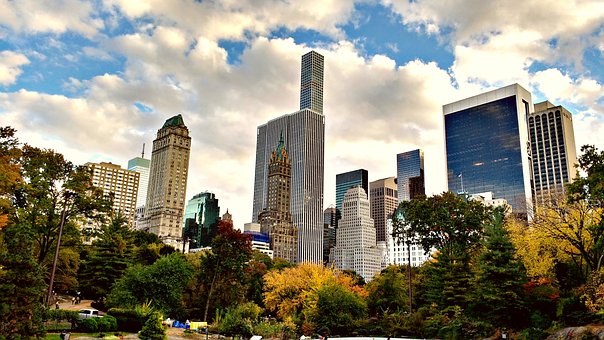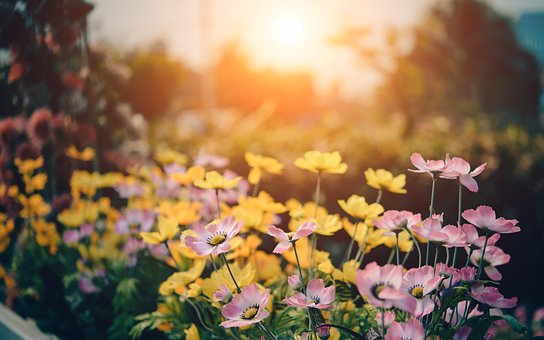
I’m so excited to tell you about an amazing medical study today that is super relevant to my favorite holistic healing modality of all time — grounding.
This fabulous study suggests that adding even a very small greenspace to an urban setting boosts immune function in a measurable and meaningful way. Published in Science Advances in October 2020, researchers found that by adding a small green play area to urban playgrounds, they boosted the immunity of the children using the play area.
Researchers in Finland added a very small, low cost green area in the corner of existing playgrounds in several different urban daycare centers. They added a little grass patch, some small plants and a planter box with garden crops the kids could tend to.
This is what one of the modifications looked like:

![]()
After only one month — just 28 days — not only did the children who played in this urban greenspace (an average of 90 minutes a day) have boosted immune markers in their blood (like boosted T cells) they also had an improved microbiota (both on the skin and in their gut biome) similar to children that lived and played in rural areas with large greenspaces and forests. These changes were statistically significant compared both to controls and to their own baseline measurements.
This study is just one example of how you don’t need to live in the country to experience improved health from nature. In fact, in my book The Earth Prescription, I go into great detail about how you can get grounded in urban settings through sidewalks, through touching a metal signpost, through simply touching a leaf on a bush or a tree — even one growing in a downtown city street — that’s all it takes to get grounded from head to toe and experience all of these health benefits.
I’m thrilled the study I shared with you today introduced an opportunity for young kids to garden. Hopefully this is all the encouragement you might need to consider planting your own crop or two. Just a few planters or pots on a doorstep works. As today’s study suggests, even a park with a small greenspace, or possibly a community garden if you are lucky enough to have access to one, is enough to significantly improve your well being.
And there are tons of benefits of interacting with plants (from tending to a single blade of grass, to a few herbs in pots, to a few veggies planted in planter boxes, to a huge urban garden) beyond all the benefits of grounding.
It’s actually healing just to be around plants of any kind, even while ungrounded (for example, just seeing a plant through a window or adding a potted plant to a workspace) can provide measurable health benefits.
Read through this list of the top 10 perks of gardening and see if it doesn’t inspire even those of us who are non-gardeners to dive into this wonderful activity. From a windowsill garden to a flower bed to a large plot of farmland, gardening is more than a way to grow flowers and food… it’s a lifestyle that can help ensure longevity and health.
Read on to discover some surprising ways that gardening is doing more for your health than you ever thought possible:
I painted this artwork to show the healing benefits of nature to our central nervous system!
1. Gives You A Healthier Brain
Every minute you spend out in your garden is brain protective… so much so, that having gardening as a hobby actually lowers your risk of dementia! A study published in 2006 in the Medical Journal of Australia found that daily gardening decreased dementia risk by in incredible 36%. A follow up study, published in 2019 in The International Journal of Environmental Research and Public Health, found that gardening actually increased levels of brain nerve growth factors.
Another incredibly interesting study, recently published in January 2020 in The International Journal of Environmental Research and Public Health, found that a gardening intervention program significantly boosted levels of the brain neurotransmitters tryptophan and serotonin, which are necessary for healthy sleep patterns and mood stabilization.

2. Gives You Boosted Mental Health
Multiple studies have found that having access to a garden or other green space decreases depression rates, anxiety rates, and dramatically reduces stress. One study, called the MIND study (conducted in 2007) found that simply walking through a garden or greenway significantly improved mental health, while walking through areas without greenery (such as a shopping mall) significantly decreased mental health.
If simply walking through a green space impacts mental health so much, you can probably guess that hand’s on gardening would boost mental health even more. And you would be right. After an extensive systemic review of 22 studies looking at the health impact of gardening, the results of this meta-anylsis (published in Preventive Medicine Reports in 2016) found that gardening significantly reduced anxiety levels, anger levels and depression rates, decreased tension, stress levels and boosted mood… all while simultaneously improving life satisfaction and boosting over all quality of life. It’s absolutely incredible that simply tending to a garden can offer such a transformative life make-over, but it’s true!

3. Lowers Your Blood Pressure
Even indoor gardens can positively impact on your well being, so don’t discount the power of a windowsill garden or a simple house plant to support your health. An exciting study published in 2015 in the Journal of Physiological Anthropology, showed that simply adding plants to an indoor computer room not only boosted the worker’s productivity, it also significantly decreased their blood pressure.
Another study, published in 2007 in the American Society for Horticultural Science found that workers with potted plants in close proximity to them while working took less sick leave off from work and enjoyed increase productivity.

4. Helps You Recover Your Health Faster
Being physically near plants is so impactful to our mental and physical health that it turns out, even just seeing a plant can significantly impact our recovery from stressful health events. We have such an innate need to be submersed in a world with foliage and plants around us that a study (published in 1984 in Science) found that patients who simply had a view of plants through a window while recovering from surgery had better moods, used less pain medications, had less surgical post-op complications, and even decreased their length of stay in the hospital.
Less pain during recovery and getting to go home sooner after surgery just by looking at plants? That’s an awesome health strategy that I wish more hospital and clinics would take into account when designing their architecture.

5. Decreases Your Body’s Inflammation
One of my biggest passions as a holistic physician is encouraging people to touch the earth to decrease inflammation in their body, a healing practice known as grounding. A study on grounding, published in the Journal Of Alternative and Complimentary Medicine in 2010, found that subjects who were grounded while exercising had 40% lower levels of creatinine kinase (a marker of muscle inflammation) and less soreness after exertion than non-grounded subjects. They also had lower pain levels, significantly lower blood cortisol levels, and even lower white blood cell counts.
When you are grounded to the earth, as you are during gardening while touching the ground in any way, including touching any plants, soil, dirt, rocks and water that is on the earth, you are supporting your health in so many ways. For more information on the whole body benefits of grounding, see any of these articles I’ve got waiting for you on my Grounding Medical Studies page here or read my book The Earth Prescription right here.

6. Reduces Your Toxic Burden
One of the very best things about gardening is that you can have a direct impact in reducing your body’s total toxic burden. By growing your own garden, you can reduce your environmental exposures to pesticides and insecticides by choosing non-toxic, organic gardening practices and choosing not to apply toxic chemicals to your garden space, as well as reducing the amount of pesticides that you directly consume when you eat edibles from your garden that haven’t been treated with chemicals.
With over 5.6 billion pounds of pesticides used globally each year, it’s estimated that the average person eating store bought foods, including store bought produce, eats over a pound of chemicals every year. The good news is that it only takes a few days of eating your own garden fresh produce to dramatically reduce the concentration of measurable pesticides in your body. One study, published in Environmental Research in 2019, found that eating organic produce for just one week significantly reduced urine pesticide concentrations in study participants by 70%. One week!

7. Increases Your Nutritional Intake
Not only will eating your home grown produce reduce your toxic burden from things you don’t want — like exposures to unwanted chemicals — it can also dramatically boost the things you do want to go into your body… like active antioxidants and powerful vitamins. Even organic produce sold in a grocery store can lose half of it’s vitamins and phytonutrients by the time you get it home and eat it, especially water soluble vitamins like Vitamin C, Vitamin B6 & B12, thiamin, riboflavin and niacin.
Just by eating your food fresh picked, garden-to-table, you reduce the loss of nutrients that inevitably happens when shipped, stored and displayed at super markets. Fruits and vegetables are extremely sensitive to and heat and light exposures, rapidly degrading over time. A study published in the Journal of the Science of Food and Agriculture in 2007 found that most produce loses about 30% of their nutritional content three days after picking. Some dramatically more, for example, spinach can lose up to 90% of it’s vitamin C activity within 24 hours of harvest. While freezing produce might help slow nutrient degradation, the ultimate solution to having vibrantly nutritious, fresh foods to eat is to grow them yourself and consume them that day, if not the very minute you pick it!

8. Gives You Better Sleep
There is a beautiful relationship between our sleep cycle and mother earth. Most people believe that our circadian (day/night) rhythm is dependent on sunlight to set that pattern for us, but scientists feel that the earth’s energy field has as much, if not more, to do with our sleep/wake pattern than even the sun, and they have known this since a pioneering study conducted back in 1970. Published in Life Sciences in Space Research, researchers discovered just how influential the earth is to our sleep patterns.
Looking at several hundred test subjects that lived for a two month period of time in a bunker that was blocked from sunlight but still had the earth’s electromagnetic field surrounding them, scientist discovered that they kept sleep/wake patterns that were close to a 24 hour rhythm. Meanwhile, test subject that lived in a bunker that was completely shielded from the earth’s energies became completely desynchronized and experienced significantly longer, and much more irregular, sleep/wake rhythms. Researchers then experimented with introducing different electrical and magnetic fields into the shielded bunker, and only one frequency was able to restore normal sleep/wake patterns… the frequency of Mother Earth’s natural energy, the Schumann frequency.
From this the researchers postulated that it is actually the frequency of the earth that regulates our natural biorhythms. Based off of this understanding, it’s easy to understand how directly connecting to the earth through gardening daily can help enhance restorative sleep at night and boost daytime wakefulness.

9. Boosts Your Vit D Levels
By now we’ve all heard of the importance of getting adequate Vitamin D… vitamin D protects so many different aspects of our health, from decreasing diabetes risk to boosting weight loss benefits to decreasing depression risk to preventing depression to predicting better cancer recovery to boosting fertility!
But does gardening actually increase Vitamin D levels? Yes, says a study published in PLOS One in 2014. Researchers studied thousands of blood samples from patients who engaged in a variety of activities, and found that gardening and cycling were the only two activities that significantly decreased the risk of vitamin D deficiency… superior all other outdoor activities, including fishing and walking. Gardening boosted Vitamin D levels across all age groups, so it’s a fantastic pastime that you never need to outgrow, a hobby to get into for life!

10. Increases Your Longevity
A study published in the Journal of Internal Medicine in 2016 found that people who stayed indoors and avoided sun exposure actually had a shorter life span than those who spent time outside. Participants who avoided the sun had higher rates of cardiovascular disease, diabetes, multiple sclerosis, and pulmonary disease than those who had daily sun exposure. And the results were dose-specific… meaning that the benefits of increased life expectancy went up directly in correlation to the amount of sun exposure. Longer time in the sun = longer life span. That simple! Gardening is a fantastic way to routinely be inspired to go outside and get that sunshine and fresh air, two of natures best holistic health treatments.
Another reason that being a gardener might lengthen lifespan, besides getting more sunlight, is the increase in activity level. A fabulous study (published in 2019 in the American Journal of Preventive Medicine) found that replacing just 30 minutes of sitting each day with light physical activity was enough to significantly decrease mortality rates. And again, here’s the clincher: the health benefit of replacing sedentary time with light physical activity was actually even stronger if you were older than 75 years old. So light activity decreased mortality rates in adults older than 75 years old even more than it decreased mortality rates in younger age groups. In other words, the older you are, the more that activity of any kind increases your lifespan.

And now we can add on #11: Boosts Your Immune System
As I talk about at the beginning of this article, this amazing medical study found that after only one month of playing on a small playground that had an area converted to a greenspace, the children’s immune systems got a significant boost. Markers of immunity in the blood, like TGF-β1 levels, regulatory T cells and the plasma IL-10:IL-17A ratio, all increased after just 28 days of playing in these small urban greenspaces.
All it took to get these improvements to their immunity was a small patch of grass to play on, one that included a small planter with garden crops and some berry bushes.
No matter how big or small your space is, whether you have a windowsill garden, a potted houseplant or two, a few medicinal herbs grown on your porch, access to a community vegetable garden or pick-your-own orchard or berry farm, or are even blessed enough to have your own land, tending to plants and growing flowers or food is one of the most rewarding, most pleasurable activities that I can recommend.

It’s never too late to lengthen your lifespan and boost your health through daily activity — and that includes gardening.
When you combine the fact that gardening has been proven to have huge mental health benefits, longevity benefits, grounding benefits, nutritional benefits and more, you would be hard pressed to find another activity that supports your health from so many different angles and in so many ways.
xoxox, Laura
P.S. Want another easy way to boost your health through an increased exposure to nature, even while living in a city? Hop over here to read why just listening to bird and increasing your exposure to birds boosts your mental health and happiness. Even from a city highrise, you can get birds to visit your window bird feeder, as I show you in this article:



